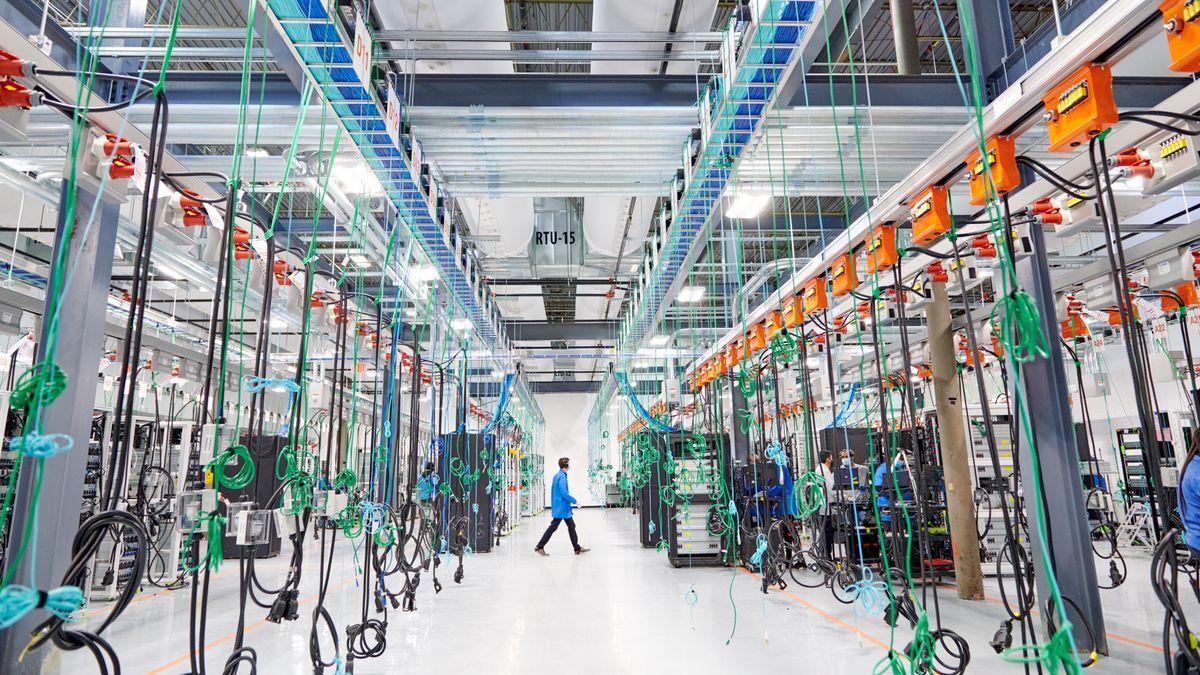AMD Acquires Neuralink Veterans' AI Startup MK1 to Enhance Instinct GPU Performance
2 Sources
2 Sources
[1]
AMD snaps up MK1 to accelerate inference and reasoning on Instinct GPUs - SiliconANGLE
AMD snaps up MK1 to accelerate inference and reasoning on Instinct GPUs Chipmaker Advanced Micro Devices Inc. has added to a string of recent acquisitions, buying a startup called MK1 that develops software to enhance the inference and reasoning capabilities of its artificial intelligence processors. The acquisition was announced in a blog post by AMD Corporate Vice President of Software Development Anush Elangovan, who said MK1's software will help the company to "advanced AI performance and efficiency" across its computing stack. The plan is for MK1's team to join AMD's Artificial Intelligence Group, he added. MK1 is led by a friend of Elon Musk - the Neuralink Corp. co-founder Paul Merolla. At Neuralink, Merolla helped lead that company's chip design efforts and develop algorithms capable of decoding brain activity. He founded MK1 alongside Thong Wei Koh, who was formerly a team lead at Neuralink, working on the development of brain neural signal processing systems. Their work at MK1 is different. There, they have created software that's designed to accelerate AI inference and reasoning on AMD's Instinct graphics processing units, and it has been a big hit. According to Elangovan, the startup's Flywheel technology currently serves more than one trillion tokens per day. He explained that the software is uniquely able to take advantage of the Instinct chip's memory architecture, and that the acquisition will support the delivery of more "accurate, cost-effective and fully traceable reasoning" at much greater scales. "Together, we'll accelerate the next generation of enterprise AI, enabling customers to automate complex business processes and unlock new opportunities in high-value applications," he said. AMD has gained a lot of momentum in the AI industry in recent months, notably agreeing a deal with OpenAI Group PBC to deploy more than six gigawatts of Instinct-powered compute resources at that company's data centers. A big part of the company's success is down to its successful acquisition strategy, which has seen the chipmaker buy up startups that can enhance and optimize its software capabilities. In its biggest acquisition so far this year, AMD paid $4.9 billion to snap up a company called ZT Systems, which manufactures hardware such as computer servers and integrated server racks for cloud data centers. That deal has allowed AMD to accelerate the development of rack-scale systems powered by its Instinct GPUs, and is believed to be one of the main factors in OpenAI's decision to invest in its hardware. It was an expensive deal, but the company was able to recoup most of that investment last month when it sold ZT Systems' manufacturing unit to the U.S. electronics manufacturing services giant Sanmina Corp. for $3 billion, while retaining its design and enablement teams. In its latest earnings call last week, AMD revealed it has spent $36 million on various other acquisitions this year. For instance, in June it spent an undisclosed sum to buy a startup called Untether AI Inc., which sold energy-efficient inference chips for data centers and edge networks. That deal came just days after it purchased a compiler startup called Brium, which enables AI software and applications to run on non-Nvidia Corp. GPUs without rewriting their code. It's an important capability for AMD, as many developers optimize their software specifically to run on Nvidia's hardware. Back in May, AMD snapped up Enosemi Inc., a developer of silicon photonics-based networking chips that help to connect massive clusters of GPUs together so they can work in concert to run the largest AI models. Last week, AMD revealed it had seen a significant increase in sales of its central processing units, as well as its Instinct GPUs, generating record-breaking revenue of $9.25 billion during its last quarter.
[2]
AMD Buys AI Startup Led By Neuralink Veterans In Ongoing Acquisition Spree
The combination of MK1's software and AMD's Instinct GPUs will enable the delivery of 'accurate, cost-effective and fully traceable reasoning at scale,' says an AMD executive, referring to the process at the heart of agentic AI workloads. AMD said Monday it has bought an AI software startup founded by two veterans of Elon Musk's Neuralink firm as part of an ongoing acquisition spree to build out its AI capabilities against Nvidia. Anush Elangovan, AMD's corporate vice president of software development, wrote in a blog post that the chip designer completed its acquisition of MK1, a Mountain, View, Calif.-based provider of inference and enterprise AI software, to "advance AI performance and efficiency across the stack." [Related: Exclusive: Intel Is Losing A Data Center AI Executive To AMD] Elangovan, who joined AMD in 2023 through a previous AI acquisition, said the MK1 team will join AMD's Artificial Intelligence Group, "where their technology and expertise will play a key role in advancing our high-speed inference and enterprise AI stack." MK1 was started by Neuralink co-founder Paul Merolla, who co-led chip design and the development of algorithms that decode brain activity, along with Thong Wei Koh, a former team lead at the Elon Musk-owned firm who focused on brain neural signal processing. Other team members include former engineers at Neuralink, Meta, Tesla and Apple. According to Elangovan, MK1 has been focused on "high-speed inference and reasoning-based AI technologies optimized for large-scale deployments" running on AMD hardware, currently serving more than 1 trillion tokens a day. Elangovan said MK1's Flywheel and comprehension engines are designed to take advantage of the memory architecture of AMD's Instinct GPUs -- which have gained momentum in the AI infrastructure market with the company sealing a deal with OpenAI to deploy 6 gigawatts of Instinct-based infrastructure as part of a strategic partnership. The combination of MK1's software and AMD's Instinct GPUs will enable the delivery of "accurate, cost-effective and fully traceable reasoning at scale," added Elangovan, referring to the process at the heart of agentic AI workloads. "Together, we'll accelerate the next generation of enterprise AI, enabling customers to automate complex business processes and unlock new opportunities in high-value applications," he wrote. The Santa Clara, Calif.-based company announced the MK1 acquisition after disclosing last week that it paid $36 million on acquisitions outside its blockbuster $4.9 billion ZT Systems deal earlier this year to boost its AI and data center capabilities. Those earlier acquisitions consisted of silicon photonics startup Enosemi, which AMD scooped up to "support and develop a variety of photonics and co-packaged optics solutions across next-gen AI systems;" compiler startup Brium, which the company is using to provide "highly optimized AI solutions;" and the technical employees of AI chip startup Untether AI. The disclosure was made as AMD reported a "sharp" jump in sales for its CPUs across the PC and server segments as well as its Instinct data center GPUs, which allowed the company to deliver record revenue of $9.2 billion for the third quarter. As CRN previously reported, AMD has leaned heavily into acquisitions over the past few years to flesh out its GPU, system and software capabilities in its growing rivalry with Nvidia in the AI infrastructure market. The company has used its largest acquisition this year, ZT Systems, to develop rack-scale AI solutions based on its Instinct GPUs, and the move has played a key role in helping AMD win over big customers, including OpenAI. AMD sold the manufacturing unit of ZT Systems to U.S. electronics services giant Sanmina for $3 billion in October, keeping the business' design and customer enablement teams.
Share
Share
Copy Link
AMD has acquired MK1, an AI software startup founded by Neuralink veterans, to accelerate inference and reasoning capabilities on its Instinct GPUs. The acquisition is part of AMD's broader strategy to compete with Nvidia in the AI infrastructure market.
AMD Expands AI Capabilities with MK1 Acquisition
Advanced Micro Devices Inc. has completed the acquisition of MK1, an AI software startup founded by veterans of Elon Musk's Neuralink, as part of its ongoing strategy to challenge Nvidia's dominance in the artificial intelligence infrastructure market
1
. The acquisition was announced by AMD Corporate Vice President of Software Development Anush Elangovan, who emphasized that MK1's technology will help advance "AI performance and efficiency" across AMD's computing stack2
.Leadership Team with Neuralink Pedigree
MK1 was founded by Paul Merolla, a co-founder of Neuralink who previously led chip design efforts and developed algorithms capable of decoding brain activity at the neurotechnology company
1
. Merolla partnered with Thong Wei Koh, a former Neuralink team lead who specialized in brain neural signal processing systems development. The startup's team also includes former engineers from Meta, Tesla, and Apple, bringing diverse expertise to AMD's Artificial Intelligence Group2
.Flywheel Technology Drives Performance
MK1's flagship Flywheel technology has demonstrated significant scale, currently serving more than one trillion tokens per day according to Elangovan
1
. The software is specifically designed to leverage the memory architecture of AMD's Instinct graphics processing units, enabling what AMD describes as "accurate, cost-effective and fully traceable reasoning at scale"2
. This capability is particularly crucial for agentic AI workloads that require sophisticated reasoning processes.
Source: SiliconANGLE
Related Stories
Strategic Acquisition Pattern
The MK1 acquisition represents the latest in AMD's aggressive acquisition strategy, with the company spending $36 million on various acquisitions this year beyond its blockbuster $4.9 billion ZT Systems deal
1
. Earlier acquisitions included Untether AI Inc. for energy-efficient inference chips, compiler startup Brium to enable AI software compatibility with non-Nvidia GPUs, and Enosemi Inc. for silicon photonics-based networking solutions2
. AMD strategically sold ZT Systems' manufacturing unit to Sanmina Corp. for $3 billion while retaining the design and enablement teams.Market Momentum and Financial Performance
AMD's acquisition strategy has coincided with significant market gains, including a major partnership with OpenAI to deploy more than six gigawatts of Instinct-powered compute resources
1
. The company reported record-breaking revenue of $9.25 billion in its latest quarter, driven by increased sales of both central processing units and Instinct GPUs2
. This financial performance reflects AMD's growing competitiveness in the AI infrastructure market against established players like Nvidia.References
Summarized by
Navi
[1]
Related Stories
AMD's Strategic AI Acquisitions: Brium, Untether AI Team, and Enosemi Bolster Competitive Edge Against Nvidia
05 Jun 2025•Technology

AMD Acquires ZT Systems for $2.7 Billion to Boost AI Server Market Presence
21 Aug 2024

AMD Completes $4.9 Billion Acquisition of ZT Systems to Boost AI Infrastructure Capabilities
01 Apr 2025•Business and Economy

Recent Highlights
1
Samsung unveils Galaxy S26 lineup with Privacy Display tech and expanded AI capabilities
Technology

2
Anthropic refuses Pentagon's ultimatum over AI use in mass surveillance and autonomous weapons
Policy and Regulation

3
AI models deploy nuclear weapons in 95% of war games, raising alarm over military use
Science and Research





